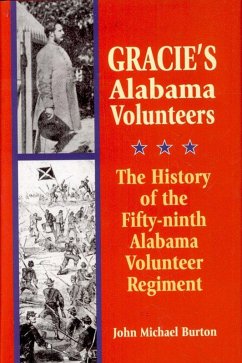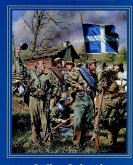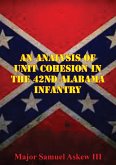"It is a well written, well researched, and a very informative regimental history." --Lake Charles American Press
"As Gracie's men passed in echelon of battalions, as handsome of a command as ever moved to such perilous work." --Colonel Oats of the Fifteenth Alabama, writing about the Battle of Chickamauga The Fifty-ninth Alabama Volunteer Regiment, led by the New york-born Brig.
Gen. Archibald Gracie, Jr., saw heavy action at Beans Station, Tennessee, and in Virginia at the battles of Richmond and Petersburg. It was one of the few confederate regiments that lost more men to the musket than to disease during the Civil War. Quoting from authentic letters, the author describes the regiment's odyssey from its origins as Hilliard's Alabama Legion to its final days as part of the Army of Northern Virginia. Complete muster rolls are included.
The author's great-great-grandfather, William Tate Burton, volunteered at the age of twenty-nine and was with Gracie's regiment for the entire war. When injuries kept him from active combat, he served the regiment in the demanding and dangerous role of teamster, driving the heavy wagons filled with crucial weapons and supplies.
"As Gracie's men passed in echelon of battalions, as handsome of a command as ever moved to such perilous work." --Colonel Oats of the Fifteenth Alabama, writing about the Battle of Chickamauga The Fifty-ninth Alabama Volunteer Regiment, led by the New york-born Brig.
Gen. Archibald Gracie, Jr., saw heavy action at Beans Station, Tennessee, and in Virginia at the battles of Richmond and Petersburg. It was one of the few confederate regiments that lost more men to the musket than to disease during the Civil War. Quoting from authentic letters, the author describes the regiment's odyssey from its origins as Hilliard's Alabama Legion to its final days as part of the Army of Northern Virginia. Complete muster rolls are included.
The author's great-great-grandfather, William Tate Burton, volunteered at the age of twenty-nine and was with Gracie's regiment for the entire war. When injuries kept him from active combat, he served the regiment in the demanding and dangerous role of teamster, driving the heavy wagons filled with crucial weapons and supplies.









